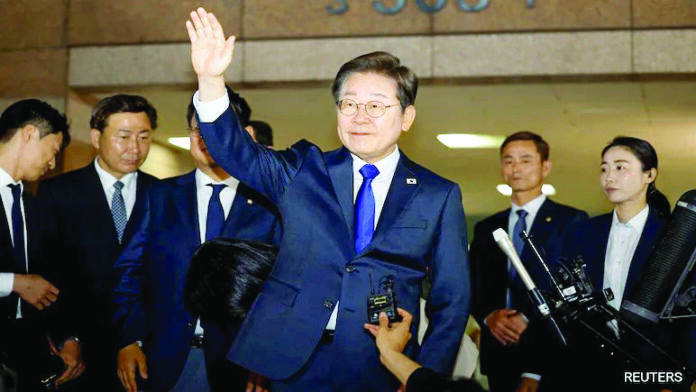South Korea’s election faced digital manipulation, with 30% inauthentic accounts spreading disinformation and negative sentiment.
NEW DELHI: In the run-up to South Korea’s June 3 presidential election, nearly 30% of online accounts participating in the digital conversation were found to be inauthentic, with some promoting claims of election rigging and Chinese involvement, according to findings from Cyabra, an Israeli open-source intelligence firm.
According to data reviewed by The Sunday Guardian from Cyabra, more than 1,400 profiles on TikTok and X (formerly Twitter) were analysed between April 10 and May 10, 2025. Of these, 29% were identified as inauthentic, while 14% were spreading negative sentiment. The data also showed that 33% of accounts geolocated within South Korea were responsible for distributing negative messaging, much of it centred around political and economic issues.
The report highlights a sharp increase in negative sentiment beginning on April 30 and peaking on May 5, coinciding with public discussions around President Yoon’s impeachment. During this period, inauthentic accounts played a visible role in amplifying emotionally charged narratives. Notably, “Cyabra identified a coordinated bot campaign promoting a narrative claiming the upcoming elections are rigged, even stating that China is involved,” the report states.
However, the report does not verify the accuracy of the China-related claims, nor does it attribute them to any specific origin. It also remains unclear which candidate the bad actors may have intended to support.
Cyabra identified one user, @cjhdreamer, as a high-impact inauthentic account contributing significantly to the discourse. The account published content claiming that the election was being “controlled by the left” and had a potential reach of 2,000 users.
Beyond the political angle, the campaign also targeted economic grievances. Coordinated profiles blamed the government’s housing loan policies for South Korea’s rising household debt, portraying the administration as fostering financial instability.
With over 50.4 million internet users—representing 97.4% of its population—South Korea is one of the most digitally connected countries in the world. While this enables broad democratic engagement, it also makes the country highly susceptible to manipulated narratives and large-scale disinformation, especially when inauthentic accounts are algorithmically amplified.
Jill Burkes, Head of Communications at Cyabra, told The Sunday Guardian that the campaign reflected a more advanced manipulation cycle, involving early coordination, emotionally charged deepfakes, and a high mix of inauthentic domestic and foreign activity.
“It successfully influenced what both real users and officials were saying. The tactics were deliberate, calculated, and designed for maximum visibility online and real-world influence offline. This previews what’s coming in the 2025 and 2026 elections worldwide. South Korea shows just how easy it is to poison the narrative before voters even reach the ballot box,” Burkes said.
Opposition leader Lee Jae-myung went on to win the snap election by a margin of nearly three million votes over Kim Moon-soo of the ruling People Power Party.
India would do well to observe these developments closely, given recent geopolitical shifts and the positions it has taken in recent years. With its own general elections scheduled for 2029 and an expected 1.2 billion mobile internet users by then, the country faces similar vulnerabilities. The emergence of inauthentic accounts pushing politically disruptive and foreign interference narratives in South Korea demonstrates how quickly disinformation operations can distort democratic discourse—especially in hyper-connected societies.








